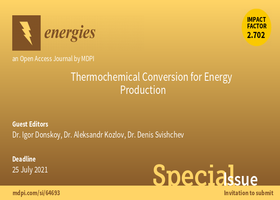Thermochemical Conversion for Energy Production
A special issue of Energies (ISSN 1996-1073). This special issue belongs to the section "A: Sustainable Energy".
Deadline for manuscript submissions: closed (25 July 2021) | Viewed by 5665

Special Issue Editors
Interests: combustion; gasification; pyrolysis; fuel; energy
Special Issue Information
Dear Colleagues,
This Special Issue is devoted to processes and systems using thermochemical conversion of fuels, including combustion, gasification, pyrolysis, torrefaction, and hydrothermal conversion. Efficient processing of various fuels is one of the most crucial problems in energy and chemical engineering, and studies in this field are motivated by technical, economic, and environmental factors. Organic fuel is still the main energy source today, and it will be for a long time to come. Besides well-known processes, new, efficient methods of thermochemical conversion have been developed, such as chemical looping cycles, catalytic conversion, oxy-fuel conversion, solar-driven conversion, and electrochemical conversion.
There are well-known trends in thermochemical conversion studies. Biomass, being traditionally a main fuel in low-technical level societies, is now an attractive energy source for new, highly efficient units in developed countries due to its renewability and lower harmful emissions. Coal and other fossils, especially high-ash and high-sulphur species, are to be converted in new processes with a special emphasis on cleaning and capture stages. New fuels are being investigated, such as composite fuels, biofuels, metals, ammonia, and industrial wastes. Advanced technologies for both large and small scales of energy units are being developed to increase thermal efficiency and to reduce emissions, so the scope of the Issue is directed to recent progress and new ideas in processes of thermochemical conversion of fuels and promising units based on these processes.
Dr. Igor Donskoy
Dr. Aleksandr Kozlov
Dr. Denis Svishchev
Guest Editors
Manuscript Submission Information
Manuscripts should be submitted online at www.mdpi.com by registering and logging in to this website. Once you are registered, click here to go to the submission form. Manuscripts can be submitted until the deadline. All submissions that pass pre-check are peer-reviewed. Accepted papers will be published continuously in the journal (as soon as accepted) and will be listed together on the special issue website. Research articles, review articles as well as short communications are invited. For planned papers, a title and short abstract (about 250 words) can be sent to the Editorial Office for assessment.
Submitted manuscripts should not have been published previously, nor be under consideration for publication elsewhere (except conference proceedings papers). All manuscripts are thoroughly refereed through a single-blind peer-review process. A guide for authors and other relevant information for submission of manuscripts is available on the Instructions for Authors page. Energies is an international peer-reviewed open access semimonthly journal published by MDPI.
Please visit the Instructions for Authors page before submitting a manuscript. The Article Processing Charge (APC) for publication in this open access journal is 2600 CHF (Swiss Francs). Submitted papers should be well formatted and use good English. Authors may use MDPI's English editing service prior to publication or during author revisions.
Keywords
- Gasification
- Pyrolysis
- Combustion
- Catalytic conversion
- Promising energy units and systems
- Energotechnology
- Emission reduction
- Carbon capture
- New methods of fuel processing
- New fuels and their reactivity
- Mathematical modelling and optimization of fuel conversion processes.
Benefits of Publishing in a Special Issue
- Ease of navigation: Grouping papers by topic helps scholars navigate broad scope journals more efficiently.
- Greater discoverability: Special Issues support the reach and impact of scientific research. Articles in Special Issues are more discoverable and cited more frequently.
- Expansion of research network: Special Issues facilitate connections among authors, fostering scientific collaborations.
- External promotion: Articles in Special Issues are often promoted through the journal's social media, increasing their visibility.
- Reprint: MDPI Books provides the opportunity to republish successful Special Issues in book format, both online and in print.
Further information on MDPI's Special Issue policies can be found here.






